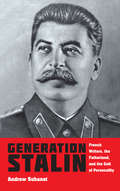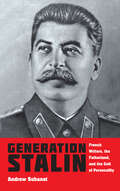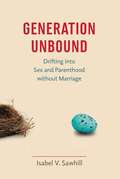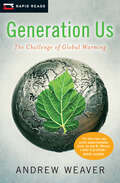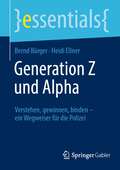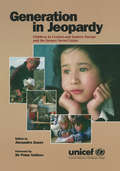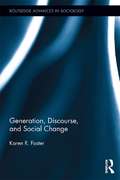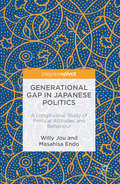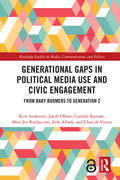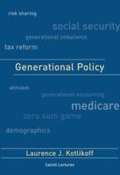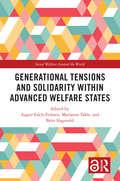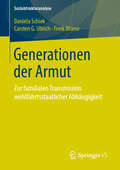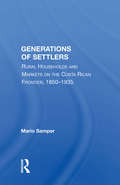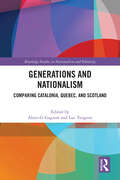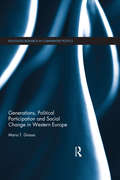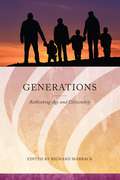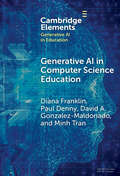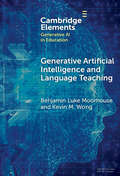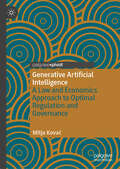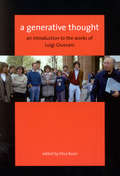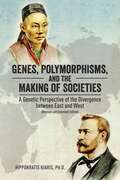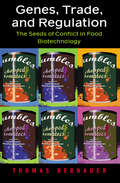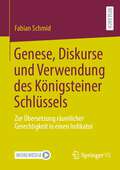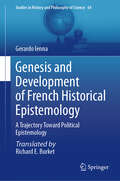- Table View
- List View
Generation Stalin: French Writers, the Fatherland, and the Cult of Personality
by Andrew SobanetGeneration Stalin traces Joseph Stalin’s rise as a dominant figure in French political culture from the 1930s through the 1950s. Andrew Sobanet brings to light the crucial role French writers played in building Stalin’s cult of personality and in disseminating Stalinist propaganda in the international Communist sphere, including within the USSR. Based on a wide array of sources—literary, cinematic, historical, and archival—Generation Stalin situates in a broad cultural context the work of the most prominent intellectuals affiliated with the French Communist Party, including Goncourt winner Henri Barbusse, Nobel laureate Romain Rolland, renowned poet Paul Eluard, and canonical literary figure Louis Aragon. Generation Stalin arrives at a pivotal moment, with the Stalin cult and elements of Stalinist ideology resurgent in twenty-first-century Russia and authoritarianism on the rise around the world.
Generation Stalin: French Writers, the Fatherland, and the Cult of Personality
by Andrew SobanetA look at how four French writers of the 1930s, ‘40s, and ‘50s contributed to the rise of Stalin in their country and abroad.Generation Stalin traces Joseph Stalin’s rise as a dominant figure in French political culture from the 1930s through the 1950s. Andrew Sobanet brings to light the crucial role French writers played in building Stalin’s cult of personality and in disseminating Stalinist propaganda in the international Communist sphere, including within the USSR. Based on a wide array of sources—literary, cinematic, historical, and archival—Generation Stalin situates in a broad cultural context the work of the most prominent intellectuals affiliated with the French Communist Party, including Goncourt winner Henri Barbusse, Nobel laureate Romain Rolland, renowned poet Paul Eluard, and canonical literary figure Louis Aragon. Generation Stalin arrives at a pivotal moment, with the Stalin cult and elements of Stalinist ideology resurgent in twenty-first-century Russia and authoritarianism on the rise around the world.“This is an outstanding work of intellectual history. . . . Highly recommended.” —Choice“A landmark study, brilliantly written, containing exemplary scholarship. Sobanet establishes himself with this volume as one of the foremost interpreters of French intellectual life. He brings to his study a cornucopia of historical knowledge and the finesse of a first-class literary critic.” —Lawrence D. Kritzman, editor of The Columbia History of Twentieth-Century French Thought“This is an ambitious project that is well executed, with a readership that is potentially far reaching—with implications for Russian/Stalin studies, French studies, including politics and society, as well as propaganda writing and the role of the media more generally. . . . Generation Stalin is a very timely book.” —Denis M. Provencher, author of Queer French: Globalization, Language, and Sexual Citizenship in France“Sobanet’s study of “Generation Stalin” and the four writers he associates with the group, Henri Barbusse, Romain Rolland, Paul Eluard, and Louis Aragon, is, quite simply, magisterial. Written in lucid prose informed by meticulous and wide-ranging scholarship including archival material, books, essays, press items, and other relevant documents, the book provides an in-depth study of the rise of the Stalin cult in France.” —Carol J. Murphy, author of The Allegorical Impulse in the Works of Julien Gracq: History as Rhetorical Enactment in “Le Rivage des Syrtes” and “Un Balcon en forêt”
Generation Unbound
by Isabel V. SawhillOver half of all births to young adults in the United States now occur outside of marriage, and many are unplanned. The result is increased poverty and inequality for children. The left argues for more social support for unmarried parents; the right argues for a return to traditional marriage.In Generation Unbound, Isabel V. Sawhill offers a third approach: change "drifters" into "planners." In a well-written and accessible survey of the impact of family structure on child well-being, Sawhill contrasts "planners," who are delaying parenthood until after they marry, with "drifters," who are having unplanned children early and outside of marriage. These two distinct patterns are contributing to an emerging class divide and threatening social mobility in the United States.Sawhill draws on insights from the new field of behavioral economics, showing that it is possible, by changing the default, to move from a culture that accepts a high number of unplanned pregnancies to a culture in which adults only have children when they are ready to be a parent.
Generation Unbound: Drifting into Sex and Parenthood without Marriage
by Isabel V. SawhillOver half of all births to young adults in the United States now occur outside of marriage. A large proportion are unplanned. These facts suggest that today's young adults are drifting into relationships and are often unprepared for parenthood. What kind of future does this mean for their kids and for society as a whole? In Generation Unbound, Isabel V. Sawhill discusses likely causes for recent changes in the family, such as an increase in women's economic opportunities, the declining economic prospects of men, greater access to birth control and abortion, and new social norms that allow young people more choice #151;but provide less guidance on what it means to be an adult. Isabel V. Sawhill reveals an emerging class divide in patterns of marriage and childbearing: at the top of the ladder are "planners," who are marrying and having children only after establishing a career; at the bottom, and increasingly in the middle, are "drifters" who are having unplanned children early, outside of marriage, and without the stable support of a second parent. This divide is contributing to rising inequality and less social mobility in the U. S. Isabel V. Sawhill sees merit in the views of those on the political left, who argue for more social supports for the less advantaged, including more educational opportunities, expanded child care, parental leave, family-friendly workplaces, and financial assistance. She also agrees with those on the right who argue for traditional marriage as the best environment for raising children. But, she argues that public policies aimed at restoring marriage have not worked and that existing social supports cannot keep pace with an ongoing tide of childbearing outside of marriage. Instead, she points to a third way: greater personal responsibility among potential parents themselves. Drawing on new insights from behavioral economics, and the promise of new long-acting contraceptives, she suggests a future in which more children will be born to adults who want and are prepared to be parents. Contents 1. An Introduction 2. Changes in the Family: More Diversity, a Bigger Divide 3. Why We Should Worry: The Consequences of Choices about Marriage and Childbearing 4. A Growing Class Divide: Planners vs. Drifters 5. The Traditionalists vs. the Villagers: Why Government Alone Can't Solve the Marriage Problem 6. Making Better Decisions: The Need to Change the Default 7. Peering into the Future: Less Marriage, Fewer Children?
Generation Us: The Challenge of Global Warming (Rapid Reads)
by Dr. Andrew J. WeaverIn clear and accessible language, Generation Us explains the phenomenon of global warming, outlines the threat it presents to future generations and offers a path toward solutions to the problem. The reality of global warming has long been accepted within the scientific community, yet it remains a hotly debated topic at the political and social level. Why is this? Is it the fact that the ultimate effects of global warming will not be felt in our lifetimes? Do we really feel no moral responsibility for future generations? Dr. Weaver, one of the world's leading experts in the field, contends that, just as humans have been responsible for creating the problem of global warming, we must also be the solution.
Generation Z und Alpha: Verstehen, gewinnen, binden – ein Wegweiser für die Polizei (essentials)
by Bernd Bürger Heidi EllnerIn einer Zeit des rasanten Wandels, geprägt von technologischen Innovationen, weltweiten Krisen und neuen Generationen, stehen Organisationen vor der Herausforderung, sich anzupassen und zeitgemäße Arbeitsweisen zu etablieren. Dieses Buch wirft einen einzigartigen Blick auf einen Bereich, der traditionell von Ordnung und Autorität geprägt ist – die Polizei. Ein Polizist und eine Pädagogin nehmen sich der Thematik an. Durch diese unkonventionelle Zusammenarbeit entsteht eine Reflexion über die Generationen Z und Alpha und deren Herausforderungen in einem Umfeld, das nach neuen Ansätzen verlangt.
Generation in Jeopardy: Children at Risk in Eastern Europe and the Former Soviet Union
by Unicef Alexander ZouevThis disturbing volume probes beneath the rhetoric about system change in the transition societies of Central and Eastern Europe and the former Soviet Union to examine the impact of political, social, and economic dislocation, ethnic conflict and civil war on the most population: children.
Generation, Discourse, and Social Change (Routledge Advances in Sociology)
by Karen R. FosterJust what is a generation? And why, if at all, does it matter? This book asks what generation means to ordinary people, arguing that generation is real and it matters, but not in the ways that we think. Generations are not groups of people who can be categorized and attributed with static, immutable and universal characteristics, nor are they reducible to cohorts, as is the tendency in much social research. Rather, the book reveals generation to be a social phenomenon and a mechanism of social change - as a constellation of ideas and discourses that explains what happens when ideas and ideals collide, and why some discourses flourish and take hold at particular times.
Generational Gap in Japanese Politics
by Willy Jou Masahisa EndoAfter decades of stable and seemingly semi-permanent single-party dominance, Japanese politics have gone through fundamental changes since the early 1990s. Government ministries have been reorganised, prime ministerial powers strengthened, and rules for electing the lower house of parliament overhauled. Furthermore, frequent formation, merger, splintering and disappearance of new parties have continued for more than two decades. How do citizens make sense of politics amidst such rapid shifts? The authors address this question by focusing on attitudinal and behavioural changes and continuities with respect to political ideology. They explore what issues citizens associate with ideological terms, where they perceive various parties on a conservative-progressive dimension, and to what extent ideology affects their vote choice. Results of new surveys are also presented to shed light on distinctions between different ideological labels and profiles of radical right supporters. In addition, all topics are discussed with an eye to identifying divergent patterns between older and younger generations.
Generational Gaps in Political Media Use and Civic Engagement: From Baby Boomers to Generation Z (Routledge Studies in Media, Communication, and Politics)
by Erik Albæk Kim Andersen Jakob Ohme Camilla Bjarnøe Mats Joe Bordacconi Claes H De VreeseThis book investigates news use patterns among five different generations in a time where digital media create a multi-choice media environment. The book introduces a new model – The EPIG Model (Engagement-Participation-Information*Generation) – to study how different generational cohorts’ exposure to political information is related to their political engagement and participation. The authors build on a multi-method framework to determine direct and indirect media effects across generations. The unique dataset allows for comparison of effects between legacy and social media use and helps to disentangle the influence on citizens’ political involvement in nonelection as well as during political campaign times. Bringing the newly of-age Generation Z into the picture, the book presents an in-depth understanding of how a changing media environment presents different challenges and opportunities for political involvement of this, as well as older generations. Bringing the conversation around political engagement and the media up to date for the new generation, this book will be of key importance to scholars and students in the areas of media studies, communication studies, technology, political science and political communication.
Generational Policy
by Laurence J. KotlikoffKotlikoff discusses the incidence and measurement of generational policy, the relationship of generational policy to monetary policy, and the vacuity of deficits, taxes, and transfer payments as economic measures of fiscal policy.
Generational Tensions and Solidarity Within Advanced Welfare States (Social Welfare Around the World)
by Asgeir Falch-Eriksen, Marianne Takle, and Britt SlagsvoldThis book explores generation as both a reference to family or kinship structures, and a reference to cohorts or age sets. The principal objective is branching out this two-part concept through studies of tensions and solidarity within and between generations of advanced and robust welfare states. Answering key questions using multiple disciplinary approaches, the book considers how generations challenge advanced and robust welfare states; how new and young generations are affected by living in an advanced welfare state with older generations; how tensions or solidarity are understood when facing challenges; and what the key characteristics are of certain generation types. It contributes to the development of a more comprehensive generation approach within social sciences by developing the concept of generation by exploring different challenges to the welfare state such as migration, digitalization, environmental damages, demands for sustainability, and marginalization. Highlighting the escalating tensions and altered versions of solidarity between generations, this book shows how a comprehensive concept of a generation can create new insights into how we collectively coordinate and resolve challenges through the welfare state. It will be of interest to all scholars and students of social policy, sociology, political science, and social anthropology.
Generationen der Armut: Zur familialen Transmission wohlfahrtsstaatlicher Abhängigkeit (Sozialstrukturanalyse)
by Carsten G. Ullrich Daniela Schiek Frerk BlomeIn diesem Buch wird einer qualitative Studie zur intergenerationellen Armutstransmission in Deutschland vorgestellt. Anhand von familiengeschichtlichen Mehrgenerationengesprächen mit erwachsenen Mitgliedern unterprivilegierter Familien zeigen die Autor*innen, inwiefern es zur Reproduktion unentrinnbarer Schicksalsgemeinschaften oder zu Abschieden aus diesen kommen kann.
Generations Of Settlers: Rural Households And Markets On The Costa Rican Frontier, 1850-1935
by Mario SamperThis book presents conceptual issues regarding household commodity production and agrarian capitalism and refers to specific issues in Costa Rican historiography. It discusses the regional case-study, addressing issues such as the role of peasant farming in the development of agro-export production.
Generations and Nationalism: Comparing Catalonia, Quebec, and Scotland (Routledge Studies in Nationalism and Ethnicity)
by Alain-G Gagnon Luc TurgeonGenerations and Nationalism breaks new ground by placing the impact of generation and generational changes at the forefront of an investigation on the transformation of nationalist movements and the evolution of support for independence in Catalonia, Quebec and Scotland.The main objective of the book is to explore how a focus on generations and generational change can add, first, to the theoretical toolkit used in the study of nationalism and, second, can lead to a better understanding of the recent evolution of nationalism in three internal nations: Catalonia, Quebec and Scotland. The book is also an occasion to revisit the distinct evolution of nationalism in these three internal nations that have been the object of important comparative studies in the past and frequent comparisons in public discourses, but in which nationalist movements have gone through relatively distinct transformations over the past decade. The different chapters tackle nation-building, autonomy and self-determination; ethnic identity, conflict and accommodation; ethnonationalism, irredentism and separatism; and immigration, naturalization and citizenship. The book also is unique to the extent that it establishes a dialogue between scholars who are specialists of public opinion drawing on quantitative methods, and scholars drawing on different comparative historical perspectives in sociology and political science.Containing both theoretical discussions of nationalism as well as case studies and comparative analyses of nationalist movements, Generations and Nationalism will be of great interest to students and scholars researching nationalism, public opinion, youth politics, political theory and quantitative and historical methods.
Generations, Political Participation and Social Change in Western Europe (Routledge Research in Comparative Politics)
by Maria T. GrassoThis new comparative analysis shows that there are reasons to be concerned about the future of democratic politics. Younger generations have become disengaged from the political process. The evidence presented in this comprehensive study shows that they are not just less likely than older generations to engage in institutional political activism such as voting and party membership - they are also less likely to engage in extra-institutional protest activism. Generations, Political Participation and Social Change in Western Europe offers a rigorously researched empirical analysis of political participation trends across generations in Western Europe. It examines the way in which the political behaviour of younger generations leads to social change. Are younger generations completely disengaged from politics, or do they simply choose to participate in a different way to previous generations? The book is of key interest to scholars, students and practitioners of political sociology, political participation and behaviour, European Politics, Comparative Politics and Sociology.
Generations: Rethinking Age and Citizenship (Series in Citizenship Studies)
by Richard MarbackThe meaning of citizenship and the way that it is expressed by an individual varies with age, develops over time, and is often learned by interacting with members of other generations. In Generations: Rethinking Age and Citizenship, editor Richard Marback presents contributions that explore this temporal dimension of membership in political communities through a variety of rich disciplinary perspectives. While the role of human time and temporality receive less attention in the interdisciplinary study of citizenship than do spatial dynamics of location and movement, Generations demonstrates that these factors are central to a full understanding of citizenship issues. Essays in Generations are organized into four sections: Age, Cohort, and Generation; Young Age, Globalization, Migration; Generational Disparities and the Clash of Cultures; and Later Life, Civic Engagement, Disenfranchisement. Contributors visit a range of geographic locations--including the U.S., U.K., Europe, and Africa--and consider the experiences of citizens who are native born, immigrant, and repatriated, in time periods that range from the nineteenth century to the present. Taken together, the diverse contributions in this volume illustrate the ways in which personal experiences of community membership change as we age, and also explore how experiences of civic engagement can and do change from one generation to the next. Teachers and students of citizenship studies, cultural studies, gerontology, sociology, and political science will enjoy this thought-provoking look at age, aging, and generational differences in relation to the concept and experience of citizenship.
Generative AI in Computer Science Education: Challenges and Opportunities (Elements in Generative AI in Education)
by Paul Denny Diana Franklin David A. Gonzalez-Maldonado Minh TranGenerative AI is a disruptive technology that has the potential to transform many aspects of how computer science is taught. Like previous innovations such as high-level programming languages and block-based programming languages, generative AI lowers the technical expertise necessary to create working programs, bringing the power of computation to more people. The programming process is already changing as a result of its presence, even for expert programmers. It also poses significant challenges to educators around re-thinking assessment as some well-established approaches may no longer be viable. Many traditional programming assignments can be completed using generative AI tools with minimal effort, thus potentially undermining learning. In this Element, the authors explore both the opportunities and the challenges for computer science education resulting from the widespread availability of generative AI.
Generative Artificial Intelligence and Language Teaching (Elements in Generative AI in Education)
by Benjamin Luke Moorhouse Kevin M. WongThe development of Generative Artificial Intelligence (GenAI) has led to intense wonder, surprise, excitement, and concern within the language teaching profession. These tools offer the potential to assist language teachers in helping their learners achieve their language learning goals, and at the same time, risk disrupting language teaching and learning processes, the teaching profession, and possibly the instrumental needs to learn foreign languages. This Element provides an accessible introduction and guide to the use of GenAI for language teaching. It aims to facilitate language teachers' development of the professional knowledge and skills they need to use GenAI responsibly, ethically and effectively. The Element It is a valuable resource for pre-service and in-service language teachers of all experience levels. Each section includes helpful tips and questions for reflection to get teachers started with GenAI while ensuring they engage critically and responsibly with these tools. Evidence-informed approaches are promoted throughout the Element.
Generative Artificial Intelligence: A Law and Economics Approach to Optimal Regulation and Governance
by Mitja KovačThis book takes a comparative law and economics approach to explore the role of public and private actors in regulating generative artificial intelligence. The book provides an introduction and context for the creation of new generative AI technologies, now understood to be the chief goal of the leading AI companies. As autonomous ‘super-intelligences’, these technologies are still an unknown entity which nevertheless have profound implications for liberal democracy, consumer choice mechanisms, mutual trust, and political legitimacy. This book explores the deep challenges posed for lawmakers and how we can achieve an optimal form of regulation and governance of such unreliable technologies. Chapters investigate possible hybrid modes of regulation, such as a co-regulatory approach between private AI companies and public actors in addressing the issue of misinformation spread. It also explores mixed types of regulation toward research on new forms of AI, arguing that different levels of systemic risk posed by different technologies must be accounted for. Different contemporary and historical contexts for the regulation of unprecedented technical innovation are also considered, and new suggestions for policy are presented. This book is a timely resource which will be of interest to researchers and practitioners in economic governance, law and regulation, artificial intelligence, and comparative law.
Generative Thought: An Introduction to the Works of Luigi Giussani
by Elisa BuzziThe various contributors make clear the relevance of Giussani's thought to the North American and Western cultural and religious context. They point to an important element in all of Giussani's work - his proposal that the Christian Event is the answer to the deepest and most pressing questions in today's world. With his clear and vigorous awareness of the cultural, philosophical, and theological issues central to the contemporary debate, Giussani succeeds in making the truth of the Catholic tradition both reasonable and relevant. Contributors include Lorenzo Albacete (Pontifical Catholic University of Puerto Rico), Jorge Mario Bergoglio (Cardinal Archbishop of Buenos Aires), Remi Brague (Université La Sorbonne, Paris), Carlo Caffarra (Archbishop of Ferrara-Comacchio), Ralph Del Colle (Marquette University), Ravan Farhâdi (United Nations), Giorgio Feliciani (Catholic University of Sacred Heart, Milan), Neil Gillman (Jewish Theological Seminary, NY), David J. Horowitz (DHMA Inc, NY), Rodney Howsare (DeSales University), Nikolaus Lobkowicz (Catholic University of Eichstätt), Gilbert C. Meilaender (Valparaiso University, Chile), John O’Connor (Cardinal Archbishop of New York), Marc Ouellet (Pontifical Council for Promoting Christian Unity),Javier Prades (Theological Faculty, San Damaso, Madrid), David L. Schindler (John Paul II Institute, Washington, DC), Angelo Scola (Pontifical Lateran University, Rome), J. Francis Stafford (Pontifical Council for the Laity), Shingen Takagi (Koyasan University, Japan), and Michale Waldstein (Internationales Theologisches Institut für Studien zu Ehe und Familie, Gaming, Austria).
Genes, Polymorphisms, and the Making of Societies: A Genetic Perspective of the Divergence between East and West (Revised and Extended Edition)
by Hippokratis KiarisOur genes determine to a large extent who we are and why we are different from others. In this book, Hippokratis Kiaris explores how various genetic polymorphisms in different ethnic populations may affect the development of distinct cultures and eventual
Genes, Trade, and Regulation: The Seeds of Conflict in Food Biotechnology
by Thomas BernauerAgricultural (or "green") biotechnology is a source of growing tensions in the global trading system, particularly between the United States and the European Union. Genetically modified food faces an uncertain future. The technology behind it might revolutionize food production around the world. Or it might follow the example of nuclear energy, which declined from a symbol of socioeconomic progress to become one of the most unpopular and uneconomical innovations in history. This book provides novel and thought-provoking insights into the fundamental policy issues involved in agricultural biotechnology. Thomas Bernauer explains global regulatory polarization and trade conflict in this area. He then evaluates cooperative and unilateral policy tools for coping with trade tensions. Arguing that the tools used thus far have been and will continue to be ineffective, he concludes that the risk of a full-blown trade conflict is high and may lead to reduced investment and the decline of the technology. Bernauer concludes with suggestions for policy reforms to halt this trajectory--recommendations that strike a sensible balance between public-safety concerns and private economic freedom--so that food biotechnology is given a fair chance to prove its environmental, health, humanitarian, and economic benefits. This book will equip companies, farmers, regulators, NGOs, academics, students, and the interested public--including both advocates and critics of green biotechnology--with a deeper understanding of the political, economic, and societal factors shaping the future of one of the most revolutionary technologies of our times.
Genese, Diskurse und Verwendung des Königsteiner Schlüssels: Zur Übersetzung räumlicher Gerechtigkeit in einen Indikator
by Fabian SchmidDer zentrale Forschungsgegenstand dieser multimethodischen Fallstudie ist der Königsteiner Schlüssel, ein inzwischen standardmäßig verwendeter Verteilungsschlüssel zwischen den deutschen Bundesländern. Wesentliche Problemperspektive ist die Übersetzung räumlicher Gerechtigkeit in einen Indikator. Es wird argumentiert, dass Indikatoren häufig nicht unter Laborbedingungen entstehen und wirken, sondern diversen, oft nicht-intendierten Veränderungen unterliegen. Anhand historischen Materials wird die Etablierung als Standardinstrument in den Blick genommen. Der Bedeutungswandel im öffentlichen Diskurs wird durch inhaltsanalytische Auswertung eines Zeitungsartikelkorpus mit Hilfe computergestützter Topic-Modellierung gezeigt. Die Untersuchung der administrativen Verwendung als Verteilungsschlüssel für Asylbewerber erfolgt über Experteninterviews mit Entscheidern der Asylverwaltung bei der überregionalen Verteilung sowie der lokalen Unterbringung und Unterkunftsakquise.
Genesis and Development of French Historical Epistemology: A Trajectory Toward Political Epistemology (Studies in History and Philosophy of Science #64)
by Gerardo IennaThis book forms an important part of the current revival of the debate around the category of historical epistemology. The term “historical epistemology” designates a methodology or research program aimed at building a historically informed theory of knowledge and/or a history of science and technology that enhances its epistemological aspects. This book offers an original panorama of the French debate surrounding the emergence and consolidation of the intellectual program of historical epistemology over a period ranging from the end of the 19th century to the second half of the 20th century. The first section of this book sets out to reconstruct sociologically and historically the processes of circulation of ideas - both nationally and internationally - that constituted the conditions of possibility for the emergence of the very idea of historical epistemology in the French intellectual context. The second section aims instead to highlight the main theoretical positions - both epistemological and historiographical - that would make it possible to trace a relative unity of intent among the authors who make up the canon of historical epistemology (in their oppositional relationship to other intellectual trends). Particular attention is also paid to defining a “minor canon” of this tradition, represented by what is known as “mathematical thought”. The third part of the volume focuses instead on reconstructing the anthropological, sociological and political perspectives underlying the methodology employed by authors belonging to historical epistemology. The three parts combined make for a uniquely broad yet focused book that is of interest to historians, philosophers and scientists alike.
